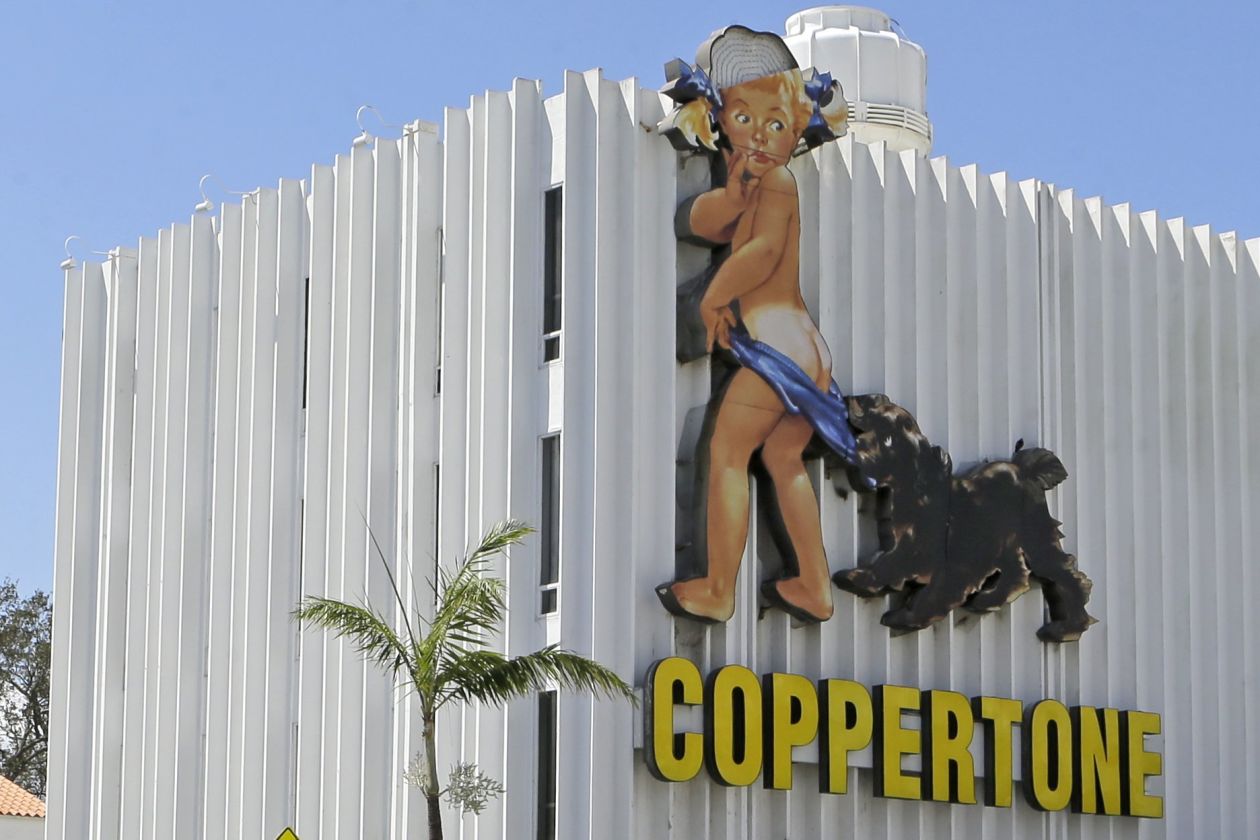Wall Street Journal: Bayer to Cut 12,000 Jobs, Shed Coppertone and Dr. Scholl’s Brands

The Coppertone girl on a building in Miami. The well-known suntan-lotion brand is going on the block. Photo: Alan Diaz/Associated Press
by Ruth Bender | Nov. 29, 2018
German company plans to cut 10% of its workforce as it seeks to regain investors’ favor
BERLIN— Bayer AG on Thursday said it would cut 12,000 jobs and sell its animal-health business, Coppertone sunscreens and Dr. Scholl’s foot-care products in an effort to win back investors’ trust after a string of setbacks and a sharp fall in its share price.
The job cuts, targeting some 10% of Bayer’s 118,200 global workforce, come as the German chemicals and pharmaceuticals company faces challenges in most of its businesses, from falling sales of over-the-counter drugs to a dwindling stable of blockbuster prescription medicines.
Compounding its difficulties, the company known mainly as the inventor of Aspirin faces nearly 10,000 lawsuits from users of weedkillers it recently acquired as part of Monsanto. Plaintiffs allege the products cause cancer, a claim Bayer has vigorously rejected.
The $63 billion Monsanto acquisition, which closed in June, was a bid by Chief Executive Werner Baumann to boost the company’s scale and give it a strong second leg in crops and seeds alongside its pharmaceutical activities.
But the legal woes have put the company on the defensive and angered some investors already skeptical of the deal when it was clinched. With the stock falling, some Bayer leaders are also growing anxious that the company could become a target for hostile investors, according to a person familiar with the company.
Bayer’s shares have lost roughly a third of their value since a San Francisco jury verdict in August found that Monsanto’s Roundup weedkillers, which contain the chemical glyphosate, were responsible for causing cancer in a man. Bayer is appealing the decision.
Thursday’s announcement wasn’t linked to the glyphosate litigation or the Monsanto acquisition, Mr. Baumann told reporters, adding that the job cuts and disposals would “position Bayer as a leader across all its businesses.”
“These changes are necessary and lay the foundation for Bayer to enhance its performance and agility,” Mr. Baumann said.
Bayer said it expected the battery of cost-saving measures and disposals to create annual savings of €2.6 billion ($2.96 billion) as of 2022, including annual synergies it was already planning to generate from its combination with Monsanto as of 2022. Overall, the planned cost savings would help free up funds for a planned €35 billion to be invested in the company’s future through the end of 2022, it said, with R&D accounting for two-thirds of this sum.
Analysts estimate that the sale of the animal-health unit, the smallest of the group’s four businesses, could fetch up to €7 billion ($8 billion) while a sale of Coppertone and Dr. Scholl’s could raise roughly €1 billion.
Thursday’s announcement initially lifted Bayer’s share price by up to 4%, but the stock later erased most of its gain and traded 0.7% lower.
While Bayer faced strategic challenges in its main activities before the Monsanto deal, the collapse of its share price in recent months and the uncertainty surrounding the Roundup lawsuits have raised pressure on management to improve the group’s outlook.
Bayer said the restructuring would help it focus on its life- science strategy—essentially its crops and drugs businesses. Analysts had called such a move inevitable after Bayer took on a large amount of debt—the company is targeting net debt of around €37 billion by the end of 2018—to fund the Monsanto deal.
In Crop Science, where Bayer is now the world’s largest provider of seeds and pesticides, the group said it would cut 4,100 jobs as it integrates the Monsanto acquisition. In pharmaceuticals, which now make up roughly half of total sales, the company said it would outsource more Research and Development activities through partnerships or licensing deals.
This overhaul—in the making for the past year under the code name “Super Bowl”—will ax some 900 job cuts in R&D, and an additional 360 through the closure of a production site in the German city of Wuppertal. The ensuing savings would be invested into external research deals, Bayer said.
Some 5,500 to 6,000 jobs at central corporate functions would also go, Bayer said, with all job cuts due to happen by the end of 2021. Bayer said it would cut a significant share of jobs in its home-market Germany.
The cuts come as Bayer is heading toward a period of slower sales growth in its prescription drugs as patents for top-selling drugs Xarelto and Eylea are due to expire from 2023. Analysts have been fretting over how Bayer planned to fill that looming gap.The consumer health division—which includes the flagship Aspirin brand—would see some 1,100 jobs go and the disposal of two brands—Coppertone and Dr. Scholl’s—whose sales had been sliding in recent quarters.
Sales and profits at the over-the-counter-drugs unit have been declining in recent quarters, partly because of tough competition in the U.S., where consumers have turned away from drugstores to cheaper, online shops. In the first nine months of 2018, sales fell 7.7% to €4.12 billion.
The decision to sell the animal-health unit follows weeks of Bayer exploring strategic options for a business it no longer sees as core and is too small to flourish under its ownership.
Mr. Baumann said Bayer had identified a number of potential buyers for the unit but that it wasn’t in advanced talks with any party.
The Rhineland-based company said it would also sell a 60% stake in chemical park operator Currenta, a company whose relevance had been waning since Bayer exited specialty chemicals business Covestro . Analysts say the Currenta stake could fetch between €1 billion and €2 billion.